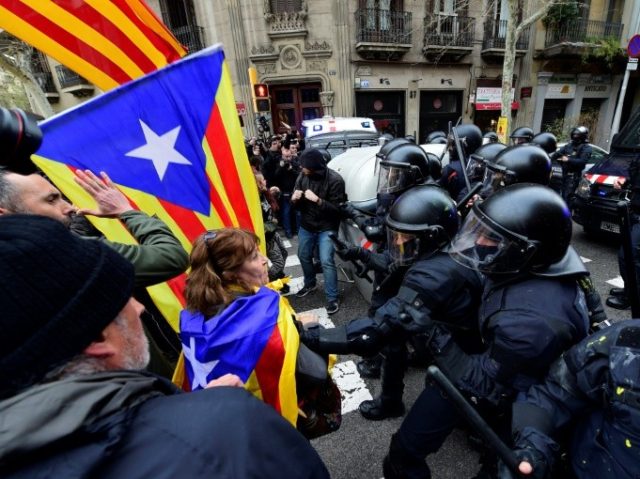This morning’s key headlines from GenerationalDynamics.com
- Violent clashes with police in Spain’s Catalonia follow arrest of Puigdemont in Germany
- Spain’s arrests of Catalonia secessionist leaders revive memories of Franco’s brutal atrocities
Violent clashes with police in Spain’s Catalonia follow arrest of Puigdemont in Germany

Catalonia protesters clash with police in Barcelona on Sunday (AP)
At least 50 people were injured on Sunday when tens of thousands of supporters of Carles Puigdemont, the former leader of Spain’s Catalonia region, clashed with Spanish police in Barcelona, Catalonia’s capital city, after Puigdemont was arrested in Germany, based on a European arrest warrant issued by a Spanish court.
The story of Puigdemont’s arrest is a kind of spy thriller.
Puigdemont led a failed attempt at Catalonian independence in September of last year, after which a Spanish court issued a warrant for his arrest on charges of treason and sedition. He fled to Belgium, where authorities refused an extradition request, on condition that Puigdemont not leave Belgium. Spain retracted the arrest warrant this year, leaving Puigdemont free to travel again.
He traveled to Finland to give some lectures, but on Friday Spain’s government issued new arrest warrants for Puigdemont and for other leaders who had supported the attempt at secession.
The new arrest warrant caught Puigdemont by surprise. When Puigdemont got word of the new arrest warrant on Friday, he immediately tried to flee Finland by car, hoping to reach the safety of Belgium undetected. He crossed the border into Sweden and traveled south into Denmark. From there, he crossed the border into Germany and was recognized and arrested in Germany when he stopped at a filling station.
If Germany extradites Puigdemont back to Spain, and he is convicted of the crimes he is charged with, then the punishment will be 25-30 years in prison. However, Puigdemont’s lawyers will try to convince Germany’s courts that they cannot extradite because the arrest is political. This is similar to the reasoning that Belgium’s court used when it refused to extradite him. Under EU rules, a court in one EU member state can only extradite a person sought by another member state if they are confident the suspect will face equivalent fair legal procedures and trial. The battles in Germany’s courts are expected to continue for weeks. For the time being, Puigdemont is in a German jail.
Puigdemont’s arrest has infuriated the half of Catalonia’s public who support him. The other half of Catalonia’s public is against independence, and many of them believe that Puigdemont should be charged and jailed. Irish Times and BBC and AP and CNN
Spain’s arrests of Catalonia secessionist leaders revive memories of Franco’s brutal atrocities
As I described last year in “23-Sep-17 World View — The 1930s Spanish Civil War fault lines explode again over Catalonia independence referendum”, memories of Generalísimo Francisco Franco’s fascist nationalism and his brutal atrocities targeting Catalonians in the extremely bloody Spanish Civil War (1936-39) are now being revived.
Puigdemont’s arrest by the Germans is being compared on social media to the arrest by the German Gestapo of Lluís Companys, the president of Catalonia during the Spanish Civil War.
After Franco’s victory in the Battle of the Ebro on July 25, 1938, at the climax of the Spanish Civil War, Franco began an offensive against Catalonia, forcing the government of Catalonia to exile itself in France. They were safe in France until France capitulated to the Nazis in June 1940. Companys was arrested by the German Gestapo in Brittany on August 13th, 1940, and handed over to the Francoist authorities on August 29th. Companys was held in solitary confinement, tortured and eventually executed by firing squad on October 14, 1940.
There are few people alive today who have personal memories of the Spanish Civil War and of the capture and execution of Companys. However, Francisco Franco did not die until 1975, and there are many people alive today, including Puigdemont himself, who have personal memories of Franco and of his severe repression of the Catalan region.
That is why many Catalonians today are comparing the German arrest of Puigdemont to the 1940 Gestapo arrest of another Catalan leader, Lluís Companys. If the German courts decide to extradite Puigdemont and turn him over to Spain’s government, then the circle of history will be complete. AFP and TeleSur TV and Barcelonas.com
Related Articles
- Catalonia’s leader says the region has ‘won the right to statehood’ from Spain (02-Oct-2017)
- The 1930s Spanish Civil War fault lines explode again over Catalonia independence referendum (23-Sep-2017)
- Catalonia referendum poised to go ahead despite Spain’s harsh repressive measures (01-Oct-2017)
- Catalonia will vote for independence from Spain on Thursday (25-Sep-2012)
- Scotland’s independence referendum is encouraging Catalonia’s separatists (11-Sep-2014)
- Catalonia parliament votes to secede from Spain (10-Nov-2015)
KEYS: Generational Dynamics, Spain, Catalonia, Barcelona, Carles Puigdemont, Finland, Germany, Belgium, Spanish Civil War, Generalísimo Francisco Franco, Lluis Companys, Battle of the Ebro, Gestapo
Permanent web link to this article
Receive daily World View columns by e-mail

COMMENTS
Please let us know if you're having issues with commenting.